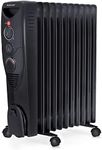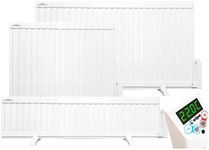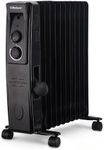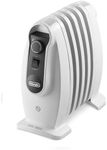Buying Guide for the Best oil radiator heater
Choosing the right oil radiator heater can make a significant difference in your comfort during the colder months. Oil radiator heaters are known for their efficiency and ability to provide consistent, long-lasting heat. When selecting the best model for your needs, it's important to consider several key specifications to ensure you get the most suitable heater for your space and requirements.Heating Power (Wattage)Heating power, measured in watts, determines how much heat the radiator can produce. This is crucial because it directly affects the heater's ability to warm up a room. Generally, heaters range from 500 to 2500 watts. For small rooms or spaces, a heater with lower wattage (500-1000 watts) is sufficient. Medium-sized rooms may require 1000-1500 watts, while larger rooms or spaces might need 1500-2500 watts. Consider the size of the room you want to heat to choose the appropriate wattage.
Size and PortabilityThe size and portability of an oil radiator heater are important for ease of use and storage. Larger heaters can provide more heat but may be less convenient to move around. Smaller, more portable heaters are easier to transport and store but may not be as powerful. If you need to move the heater between rooms or store it when not in use, look for models with wheels and handles. For stationary use in a single room, a larger, more powerful model might be preferable.
Thermostat ControlA thermostat control allows you to set and maintain a desired temperature, ensuring consistent comfort. This feature is important for energy efficiency and convenience, as it prevents the heater from running continuously and overheating the room. Look for heaters with adjustable thermostats, which can range from simple dial controls to digital displays. If you prefer precise temperature settings, opt for a model with a digital thermostat.
Safety FeaturesSafety features are essential to prevent accidents and ensure safe operation. Common safety features include overheat protection, which automatically shuts off the heater if it gets too hot, and tip-over protection, which turns off the heater if it is knocked over. These features are particularly important if you have children or pets. Always check for these safety features to ensure the heater is safe to use in your home.
Noise LevelOil radiator heaters are generally quiet, but some models may produce slight noise due to internal components. If you are sensitive to noise or plan to use the heater in a bedroom or quiet space, consider the noise level. Look for models that are specifically designed to operate silently or have noise-reducing features. Reading user reviews can also help you gauge the noise level of a particular model.
Energy EfficiencyEnergy efficiency is important for reducing electricity consumption and lowering your energy bills. Oil radiator heaters are typically more energy-efficient than other types of heaters because they retain heat for longer periods. Look for models with energy-saving modes or features like programmable timers, which allow you to set the heater to turn on and off at specific times. This can help you manage energy use more effectively.
Design and AestheticsThe design and aesthetics of the heater may be important if it will be visible in your living space. Oil radiator heaters come in various styles and finishes, from sleek and modern to more traditional designs. Choose a model that complements your home decor and fits seamlessly into your space. While design is not as critical as functionality, it can enhance your overall satisfaction with the product.















